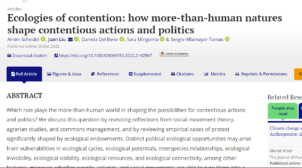
By Arnim Scheidel, Juan Liu, Daniela Del Bene, Sara Mingorria & Sergio Villamayor-Tomas.
Read it now at The Journal of Peasant Studies.
ABSTRACT
Which role plays the more-than-human world in shaping the possibilities for contentious actions and politics? We discuss this question by revisiting reflections from social movement theory, agrarian studies, and commons management, and by reviewing empirical cases of protest significantly shaped by ecological endowments. Distinct political ecological opportunities may arise from vulnerabilities in ecological cycles, ecological potentials, interspecies relationships, ecological invisibility, ecological visibility, ecological resources, and ecological connectivity, among other features. However, whether people, activists, and social movements are able to turn them into a dynamic source of power ultimately depends upon how they perceive and relate themselves to the more-than-human world.

The project ENVJUSTICE has received funding from the European Research Council (ERC) under the European Union’s Horizon 2020 research and innovation programme (grant agreement No. 695446)